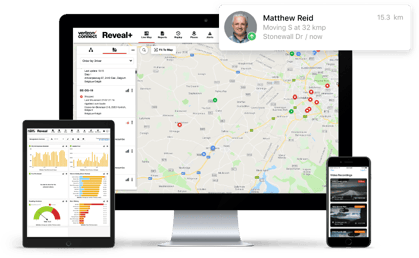Asset tracking vehicle theft prevention and recovery
A GPS tracking system is the smart choice for vehicle recovery and theft prevention. Learn more about the options here.
Read more
The widespread adoption of automated fleet management and Global Positioning Systems (GPS) tracking solutions has helped many companies streamline operations, improve driver safety and adhere to compliance regulations.
However, devices known as GPS jammers and cell phone jammers can interfere with the function of tracking devices, and present issues for fleet owners who are looking to monitor their fleet and improve productivity.
What is a GPS jammer?
GPS signal jammers are small, high power radio frequency (RF signal) transmitters that interfere with lawful communications devices—cell phones, GPS, Wi-Fi networks and also toll readers.
GPS receivers rely on low power microwave signals broadcast from GPS satellites. Signal jammers operate by overwhelming these satellite signals with higher power, but shorter range, radio signals, to create “noise” that tricks GPS tracking systems into thinking GPS signals are not available. This is also referred to as "spoofing".
Since devices that can block GPS come from a number of manufacturers, they vary greatly in shape, size and dimensions, making them hard to spot within a driver’s vehicle. Most commonly, GPS blockers work over short range, and are small enough to plug into a power supply like a cigarette lighter or iPhone and block the signal to a GPS tracker installed within the vehicle cockpit.
Yes, GPS jammers are illegal in most countries in the world. Many countries carefully regulate radio communication devices and have taken action in the past where signal jamming devices have been used or known to be sold. Despite this, GPS jammers and signal blockers can be easily ordered online.
Some may see GPS jammers as a means for drivers (and companies) to sidestep telematics mandates and measures in order to gain a competitive edge, or because of concerns over personal privacy. But any fleet vehicle that uses anti-tracking devices risks introducing insecure hardware into a vehicle and allowing hackers to gain access to the onboard telematics systems and tamper with GPS systems like navigation, positioning and more.GPS jamming devices also pose a significant risk to public safety and security.
In addition, in the event a vehicle is stolen, GPS jammers make it more difficult for law enforcement to locate the vehicle, impacting a company’s scheduling lineup and, possibly, its bottom line should the missing vehicle not be found. That’s why fleet owners should pay careful attention to any modifications that drivers make to their vehicles.
For fleet managers, it’s important to be able to monitor driver behaviour and vehicle health in order to support fleet safety and streamline costs. GPS jammers prevent accurate vehicle tracking, including distance travelled, time on the road, speeding occurrences and harsh driving instances. The inability to accurately measure this type of data can result in compliance audits, fines, and situations where vehicles aren’t properly maintained—ultimately impacting revenue and safety.
Fleet owners and managers need to understand the capabilities of their existing GPS tracking devices and navigation systems in order to recognise if and when a device is being potentially hampered by a GPS jammer. Monitoring Non Reporting Unit (NRU) trends can help to identify potential issues with GPS trackers installed within vehicles. It’s also important to have an understanding of network weaknesses, exposures and vulnerabilities that could be exploited by hackers.
In addition, keeping a regular schedule of IT network maintenance and troubleshooting to offset the possibility of data tampering can go a long way toward preventing future issues. Finally, clearly communicating with employees the company’s vehicle usage policies, and policies around prohibited devices like GPS jammers, can help discourage use of such devices in the first place.
Monitoring and alerts
Verizon Connect's GPS tracking system allows you to permanently monitor your vehicles and important equipment, reporting their location in near real-time. In the event that a GPS tracker stops reporting or GPS signal is interrupted due to GPS jamming, you can check on a live map to see if the vehicle is still visible and take action where necessary.
Remote Immobilisation
If you get alerted of suspicious activity on one of your tracked units, remote immobilisation allows you to disable a vehicle's ignition and prevent further engine start ups until further investigations have been completed.
See more about remote immobilisation
Asset tracking
Battery powered asset tracking devices allow you to monitor additional parameters on your equipment, so you can be alerted if a trailer door opens in suspicious circumstances, allowing you to act quickly and alert law enforcement if needed.
Learn more about asset tracking here.
Professional installation
Installing GPS tracking devices in your fleet vehicles professionally using a wired harness rather than more easily accessible OBD plug and play units can help conceal the location of your GPS device within the vehicle and make it harder to target with a conventional GPS signal blocker. Professional hardware installation is part of Verizon Connect Irelands initial setup.
Tags: Safety




Find out how our platform gives you the visibility you need to get more done.
A GPS tracking system is the smart choice for vehicle recovery and theft prevention. Learn more about the options here.
Read moreGPS vehicle tracking devices can help protect you from vehicle theft and increase vehicle recovery. Learn more about immobilisation...
Read moreA geofence is a virtual fence or perimeter around a physical location. It separates a location and surrounding area.
Read moreThe two most vital assets for a business that relies on its fleets are its people and its vehicles. But it is not always...
Read more